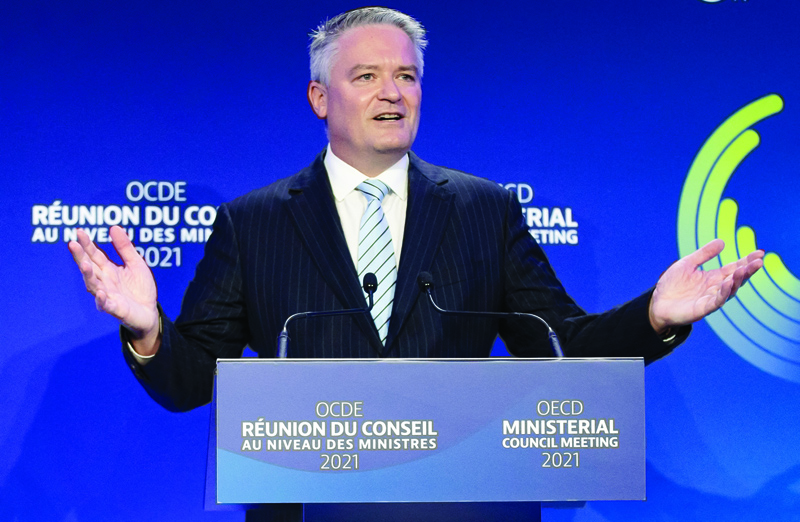 PARIS: Former Australian Finance Minister Mathias Cormann speaks during a handover ceremony during which he took on the role of Secretary-General of the Organization for Economic Co-operation and Development (OECD) at the OECD headquarters yesterday. - AFP
PARIS: Former Australian Finance Minister Mathias Cormann speaks during a handover ceremony during which he took on the role of Secretary-General of the Organization for Economic Co-operation and Development (OECD) at the OECD headquarters yesterday. - AFPPARIS: Former Australian finance minister Mathias Cormann became head of the influential Organization for Economic Co-operation and Development (OECD) yesterday, kicking off the job with a pledge to keep the global body focused on the fight against climate change. Cormann, whose nomination in March was celebrated as a diplomatic triumph in Australia, served as finance minister for seven years until late 2020 in rightwing governments.
But his campaign for the position faced fierce resistance from top environmental groups who criticized his record in successive climate-sceptic Australian cabinets, notably under former prime minister Tony Abbott. Cormann told reporters at his first news conference in the role that "we need to continue of course to promote global leadership to tackle climate change and achieve global net zero emissions by 2050".
He singled out the OECD's International Program for Action on Climate, a new tool to evaluate members' efforts to reduce emissions, as a key part of the organization's contributions. Cormann promised that the program would share its key findings in time for the UN's COP 26 climate conference in Glasgow, Scotland, in November. "We have got to explore every opportunity to maximize our emission reductions efforts," he said.
Global tax
The 50-year-old conservative took over as secretary general from longstanding chief Angel Gurria, a vocal defender of action to confront the global climate crisis during his 15 years at the helm. The OECD counts 38 states as members and acts as a sort of global think-tank on economic and policy questions, producing reports and recommendations that are influential in national capitals.
It also serves as a forum to discuss policy and has recently spearheaded talks on a new global plan to tax multinational tech groups that has become a tense issue between European countries and the United States. "We need a tax deal as soon as possible," Cormann told Le Figaro newspaper in France last month.
When asked yesterday about the chances of a deal by year-end, he acknowledged that "some work still needs to be done" but that "we are in a much better position than we were towards the end of last year". Spearheaded by US President Joe Biden, the proposal for a 15-percent minimum tax rate is to be discussed and approved by finance ministers from the Group of Seven wealthy nations at a meeting on London on Friday.
'Fair and equitable'
Cormann called on participants in the tax talks to remember that governments needed to raise revenue, and multinationals had to pay their share in a "fair and equitable" way. The head of the OECD is often invited to major international meetings alongside the heads of other multilateral institutions such as the United Nations or the World Bank.
In March, Australian Prime Minister Scott Morrison called Cormann's nomination "the most senior appointment of an Australian candidate to an international body for decades". He grew up in the small town of Raeren in eastern Belgium and speaks in strong German-accented English, which has seen him likened to "Terminator" star Arnold Schwarzenegger in his adopted homeland.
While campaigning for the OECD position, he emphasized his multilingual background - he speaks four languages - as well as his experience in Asia which was decisive in landing him the job. "You can count on me to give it my absolute best as we work towards a better future, together," Cormann said at a handover ceremony at the Paris headquarters of the organisation, according to a statement.
More than two dozen environmental groups said Cormann shouldn't have been considered for the role, citing former statements on climate change. They pointed out that he helped campaign against a carbon pricing system designed to curb emissions in Australia's carbon-intensive economy, and was a senior member of the government that repealed the scheme in 2014. Greenpeace expressed "deep dismay and anger" at the time of his appointment while the head of E3G campaign group Nick Mabey said it sent a "dangerous signal". - AFP










